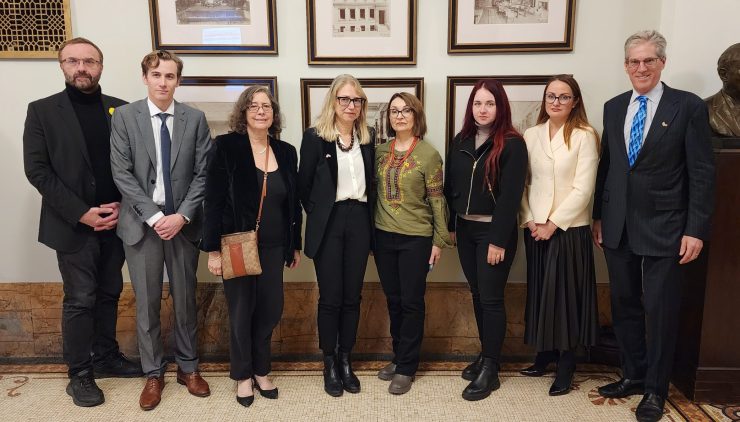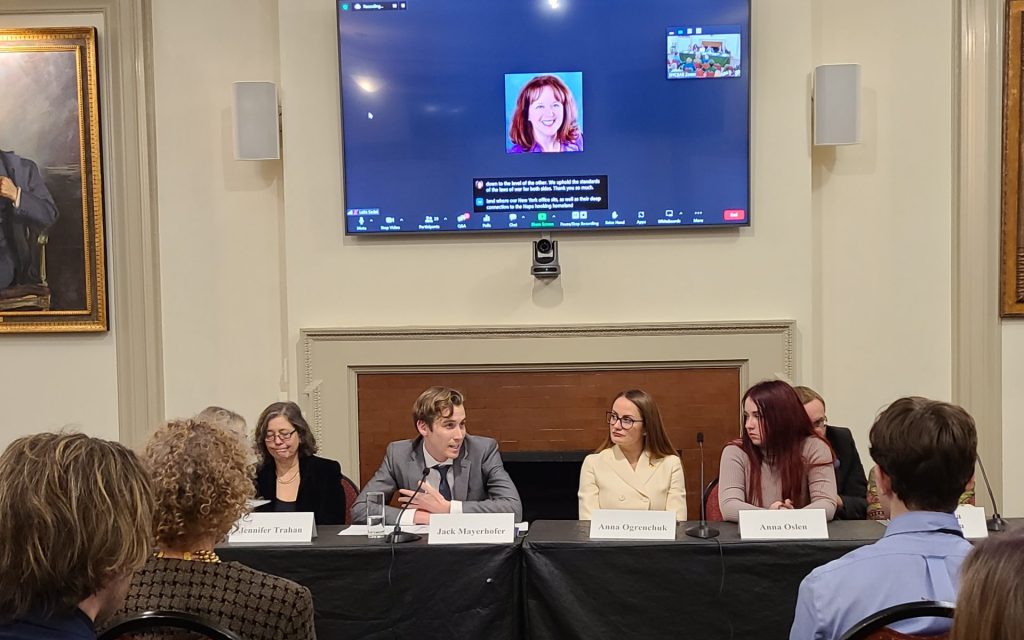Vance Center Hosts Panel on Public International Law and Atrocities in Ukraine
February 2023The Vance Center held a panel discussion at the New York City Bar Association entitled “Ukraine – Responses to Atrocity Crimes.” The panel, taking place about a year after Russia’s invasion of Ukraine, was an initiative of the Vance Center’s new Ukraine Project, which aims to extend work in the areas of rule of law and access to justice to address the war in Ukraine.

Panelists and speakers at the Vance Center’s panel discussion, “Ukraine – Responses to Atrocity Crimes,” New York, February 2023. (Photo credit: Vance Center)
The Vance Center held a panel discussion at the New York City Bar Association entitled “Ukraine – Responses to Atrocity Crimes.” The panel, taking place about a year after Russia’s invasion of Ukraine, was an initiative of the Vance Center’s new Ukraine Project, which aims to extend work in the areas of rule of law and access to justice to address the war in Ukraine.
The event began with three speakers from Ukraine, whose testimonies highlighted the human cost of the conflict and brutal conditions for prisoners of war in Ukraine. Anna Ogrenchuk, President of the Ukrainian Bar Association, accompanied and introduced Lyudmyla Huseynova, a former volunteer from Donetsk who was held for three years by Russian forces, and Anna Olsen, a former senior combat medic who was captured in Mariupol and later freed in a prisoner exchange after more than six months. Huseynova and Olsen, who had presented at the United Nations earlier that day, shared powerful personal accounts, including of the torture, isolation, and abuse that they endured in Russian captivity.
After Huseynova and Olsen, a panel of international experts offered their insights on questions of international law, documentation, and accountability for atrocity crimes committed in Ukraine, moderated by Vance Center Committee member Taisa Markus, who leads the Ukraine Project.
Jennifer Trahan, Director of the Concentration in International Law & Human Rights at New York University’s Center for Global Affairs, opened the panel by speaking about the need for a special tribunal for the crime of aggression, considering jurisdictional gaps at the International Criminal Court (ICC).
“This is a key moment for the use of the rule of law,” said Trahan, who emphasized the necessity for such a tribunal to be truly international. “It would be a hugely missed opportunity if we let one powerful state invade its neighbor with impunity. This is our Nuremberg moment.”

Panelists speak during the discussion of atrocity crimes in Ukraine. (Photo credit: Vance Center)
Trahan was followed by Leila Sadat, Professor of International Criminal Law at Washington University School of Law and Special Adviser on Crimes Against Humanity to the ICC Prosecutor, who spoke on recent developments at the ICC relating to atrocity crimes in Ukraine. Jack Mayerhofer, Executive Director at the Auschwitz Institute for the Prevention of Genocide and Mass Atrocities, then related his organization’s work conducting training and building capacity for evidence collection and documentation of war crimes, as well as the critical role of civil society organizations in this work.
“Prevention can take place at all points of a conflict,” and “a core tenet [of preventing violence] is accountability,” Mayerhofer told the audience. “Timely and proper documentation of atrocity crimes is fundamental. [Evidence] needs to be collected so it can be used in the future for accountability.”
Patrick Keenan, Professor of Law at the University of Illinois College of Law, concluded the panel, identifying challenges that the ICC Prosecutor may face gathering and ensuring the admissibility of evidence of atrocity crimes. He also noted additional challenges arising from the sheer volume of cases reported to date.
“The question is, what to do with this absolute mountain of evidence of atrocities? The stories we heard today are unfortunately not rare,” said Keenan. “We can’t look away, it’s not the time to divert our attention.”
An audience of more than 60 in person or remotely joined the event, which was co-sponsored by the Council on International Affairs, the International Law Committee and Rule of Law Task Force of the New York City Bar Association.

